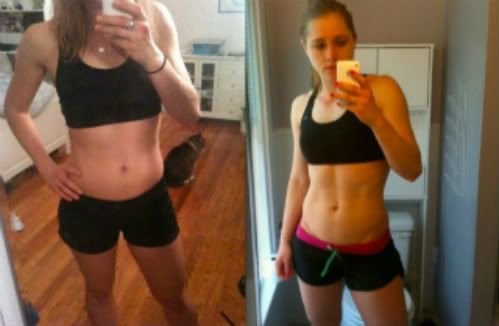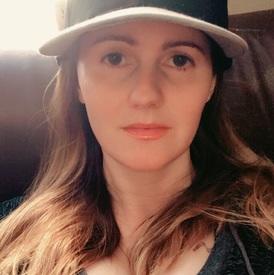**BELLY FAT**
Replies
-
Pretty much what I figured! I have been increasing my calorie count slowly... because I'm terrified of gaining much back.
Body composition is everything. The scale is nothing. That's why you're not happy even at that low weight. Use the scale as a tool to gauge progress but not as a measure of fitness. Does that make sense? Inches have astronomically more value than the number on the scale. In fact I would say that's almost the only thing that people really care about. (inches)
Now as to your fear of gaining weight losing weight is easy. EASY!!. I personally fear losing too quickly. Why? Because I don't want to lose muscle mass which is the first and foremost reason that losing weight is easy. Work on building muscle, make cardio and the scale a secondary concern and you'll get the look you want. Of course you'll gain some fat if you have a positive calorie intake but if you're lifting heavy then you'll gain muscle too. Work on building some muscle first, then carefully pull off some of the fat. No one is suggesting that you balloon up to 150 pounds. Just have a slightly positive calorie intake, work out hard with the weights, and once you get to say 125 - 130 then strip off the excess and repeat.
Do some research on cutting and bulking. I know, these sound like lunk-head bodybuilder terms but you're not going to be swinging huge weight differences like the pros. The technique however is sound and the results are amazing. I'm not the expert that some here are but I'm 215 lbs. and about 15% body fat. (Working on that). I can lose or gain weight at whim simply by altering calorie intake. With the right body composition you can too. Do not fear pounds.0 -
Ab work would help shed it too I would have thought. Situps, crunches, leg raises.
No! Ab work gives you stronger abs but will not remove abdominal fat.0 -
SO I reached my goal weight but still have all this belly fat.... I was under eating... at 800 calories. Over the last few weeks, have increased them to 1200, because my doctor insisted. I do strength training 4 days a week and cardio the other 3. Is that enough of a deficit to lose the rest of this belly, bra and back fat and build lean muscle? I'm 5'4" 118 pounds.
What kind of strength training?
The reason you still have belly fat is that you did a very low calorie diet and lost a lot of muscle instead of all your fat, leaving you at a low body weight with a high body fat percentage. A MODERATE calorie deficit, heavy strength training and protein prevents muscle loss as much as possible.
In your case the damage is already done. You should probably start eating at a calorie surplus (2500 calories or so), doing heavy weight training (compound moves, 6-10 reps per set) and try to gain some muscle back before you continue to try to lose any more fat.
Awww c'mon! Can't I do something in the middle? So I can lose a little more fat and gain muscle at the same time?
Possibly. If you are new to lifting and doing the right kind. You are already at a really low weight. I'm sure your doctor agrees with me. Continuing to lose fat might be unhealthy at this point and probably won't give you the body you want. If you eat at a slight surplus and lift you can gain muscle and very little fat. I did it. I gained 10lbs. It's hard to tell where any fat I gained went. Once you've gained back some muscle (and I think, it's easier to regain it, then it'd be if you never had it) you can rededicate your efforts to fat loss.
Your body is probably a little messed up right now though. Very low calorie diets can be very damaging. You need to work your way back up to maintenance slowly and maybe eat there for a month or two. You might very well gain some weight back but that's not a bad thing. You need to fix yourself.
And I'd recommend Stronglifts 5x5, New Rules of Weight Lifting for Women, or Starting Strength for anyone looking for a good beginning weight training program. All these contain the big basic compound lifts. New Rules also contains some other things as well.0 -
Pretty much what I figured! I have been increasing my calorie count slowly... because I'm terrified of gaining much back. As far as the strength training, I do core boot camp.
Don't be terrified of gaining. You can gain and still look leaner, smaller, healthier.
I'm up 8 pounds from last summer: http://www.myfitnesspal.com/blog/LorinaLynn/view/one-year-of-strength-training-3674820 -
Let me clarify.. I'm not scared of the scale weight going up.. I'm scared of gaining FAT back as I raise my calorie intake.... I bought all new clothes dang it!0
-
SO I reached my goal weight but still have all this belly fat.... I was under eating... at 800 calories. Over the last few weeks, have increased them to 1200, because my doctor insisted. I do strength training 4 days a week and cardio the other 3. Is that enough of a deficit to lose the rest of this belly, bra and back fat and build lean muscle? I'm 5'4" 118 pounds.
You just described why not to eat too little. And 1200 remains too little. You need muscle mass in order to look like you want at your goal weight. See In Place of a Road Map 2.0 and set your calories. Then lift HEAVY (not 30DS as "strength training"). Do cardio if you love it but it isn't necessary. Good luck.0 -
Full body. And that doesn't mean lifting light weights/high reps. To increase "strength" you have to overload the muscle (which doesn't lead to muscle gain on calorie deficit) and using light weights doesn't achieve that. Heavy/light being relative to each person.I see a lot of posts saying strength training. What kind of strength training?
Great answer.0 -
i want to tell you about staci. http://www.nerdfitness.com/blog/2011/07/21/meet-staci-your-new-powerlifting-super-hero/
believe it or not, she's about 131 on the left, and 142 on the right. 0
0 -
Let me clarify.. I'm not scared of the scale weight going up.. I'm scared of gaining FAT back as I raise my calorie intake.... I bought all new clothes dang it!
You might have some initial fat increase but you have to eventually increase your calories. If you can, try to find Leigh Peele's e-book called the Metabolic Repair Manual. It has a lot of great information on how to move from underreting and overtraining to health and eventually to fat loss.0 -
Thanks for all the advice
 0
0 -
Let me clarify.. I'm not scared of the scale weight going up.. I'm scared of gaining FAT back as I raise my calorie intake.... I bought all new clothes dang it!
You might gain some. Then you can lose it again. And you'll be healthier and stronger. Consider it an investment in yourself.0 -
Bump this one for later.0
-
I speak from experience when I say cut bad carbs and limit the healthy ones. That's what I've done and I have enough energy to sustain me through my workouts, and I have a flat belly. You can do as many crunches as you want, but if you eat crap, you're not going to see the results you want.0
-
Eat less, eat clean, work out.0
-
I have a calorie defecit but i noticed the key thing is also HEAVY LIFTING.
but i have carpal tunnel on both hands constantly wearing braces n with pain spurts here and there and i can't do heavy lifting. this means im SOL?
I'm in much the same boat. I don't have carpal tunnel, but I've had arthritis in my joints since childhood. I often have to go lighter than I know I can handle on certain exercises or quit before my muscles are fatigued because my wrists, knees, or ankles get painful or give out and I don't want to compromise form. It's frustrating.0 -
Moderate calorie deficit.
Heavy weight lifting.
Adequate protein intake. (1 gram per pound of lean body mass).
How do you calculate the amount of protein needed?0 -
Let me clarify.. I'm not scared of the scale weight going up.. I'm scared of gaining FAT back as I raise my calorie intake.... I bought all new clothes dang it!
I've been maintaining now for about 7 weeks and started the New Rules of Lifting for Women at that time. I increased my calories (I'm now right around 2100 a day) and I actually lost a pants size (went from a 6 to a 4). I have definitely noticed that I'm firming up and getting some definition.0 -
Moderate calorie deficit.
Heavy weight lifting.
Adequate protein intake. (1 gram per pound of lean body mass).
How do you calculate the amount of protein needed?
If you know your body fat percentage, you can calculate your lean body mass from that. For instance, I'm 138 pounds. If I were 22% body fat I would have about 30 pounds body fat (138 x .22 = 30.36... we'll just round down to 30) and 108 pounds lean body mass (138 - 30 = 108). So I should aim for 108g of protein.
Some also suggest 0.8 pounds per total body weight, so you'd just multiply your body weight by .8, so in my case, that would be 110g of protein. So it's pretty close for me, but really, I just aim for at least 100g, with more on exercise days.0 -
Moderate calorie deficit.
Heavy weight lifting.
Adequate protein intake. (1 gram per pound of lean body mass).
How do you calculate the amount of protein needed?
As stated earlier, you should take in 1g of protein per pound of lean body mass. You'll need to know your lean body mass. Weight yourself. Then calculate your body fat percentage. There are several methods. I mostly use an electronic monitor but occasionally I'll use calipers. Multiply your weight times (1 - BF%) and you now have your lean body mass.
For example, let's say that you're 100 pounds. Your body fat percentage is 20%. 100 lbs * (1 - .2) = 80 lbs. So you would need 80g of protein. At max, you can consume 1.5 times your lean body mass. In our previous example, that would be 120g.
You could also use MFP to calculate your macros. I'm a low-carber so I do 5% carbs / 35% protein / 60% fat.0 -
Find out your body fat percentage. Multiply that times your weight and that will tell you how much pounds of fat you have. Subtract that from your current weight to get lean body mass weight.Moderate calorie deficit.
Heavy weight lifting.
Adequate protein intake. (1 gram per pound of lean body mass).
How do you calculate the amount of protein needed?
A.C.E. Certified Personal and Group Fitness Trainer
IDEA Fitness member
Kickboxing Certified Instructor
Been in fitness for 28+ years and have studied kinesiology and nutrition0 -
Moderate calorie deficit.
Heavy weight lifting.
Adequate protein intake. (1 gram per pound of lean body mass).
How do you calculate the amount of protein needed?
If you know your body fat percentage, you can calculate your lean body mass from that. For instance, I'm 138 pounds. If I were 22% body fat I would have about 30 pounds body fat (138 x .22 = 30.36... we'll just round down to 30) and 108 pounds lean body mass (138 - 30 = 108). So I should aim for 108g of protein.
Some also suggest 0.8 pounds per total body weight, so you'd just multiply your body weight by .8, so in my case, that would be 110g of protein. So it's pretty close for me, but really, I just aim for at least 100g, with more on exercise days.
Thanks, this was the easiest explanation I got. I really suck at math! especially word problems, haha.
110 grams of fat, good lord that seems a lot!0 -
Moderate calorie deficit.
Heavy weight lifting.
Adequate protein intake. (1 gram per pound of lean body mass).
How do you calculate the amount of protein needed?
If you know your body fat percentage, you can calculate your lean body mass from that. For instance, I'm 138 pounds. If I were 22% body fat I would have about 30 pounds body fat (138 x .22 = 30.36... we'll just round down to 30) and 108 pounds lean body mass (138 - 30 = 108). So I should aim for 108g of protein.
Some also suggest 0.8 pounds per total body weight, so you'd just multiply your body weight by .8, so in my case, that would be 110g of protein. So it's pretty close for me, but really, I just aim for at least 100g, with more on exercise days.
Thanks, this was the easiest explanation I got. I really suck at math! especially word problems, haha.
110 grams of fat, good lord that seems a lot!
Eating fat does not make one fat, also it is 110g of PROTEIN that was mentioned...0 -
Moderate calorie deficit.
Heavy weight lifting.
Adequate protein intake. (1 gram per pound of lean body mass).
How do you calculate the amount of protein needed?
If you know your body fat percentage, you can calculate your lean body mass from that. For instance, I'm 138 pounds. If I were 22% body fat I would have about 30 pounds body fat (138 x .22 = 30.36... we'll just round down to 30) and 108 pounds lean body mass (138 - 30 = 108). So I should aim for 108g of protein.
Some also suggest 0.8 pounds per total body weight, so you'd just multiply your body weight by .8, so in my case, that would be 110g of protein. So it's pretty close for me, but really, I just aim for at least 100g, with more on exercise days.
Thanks, this was the easiest explanation I got. I really suck at math! especially word problems, haha.
110 grams of fat, good lord that seems a lot!
Eating fat does not make one fat, also it is 110g of PROTEIN that was mentioned...
I know. Eating fat/ or eating in general does not make someone fat. I meant to put in protein, thanks for pointing that out.
110 gs of protein still seems like a lot, to me. I'm not saying it's too much or too little or whatever. it sounds like a lot. as in getting 110 gs of protein in my daily diet.0 -
Moderate calorie deficit.
Heavy weight lifting.
Adequate protein intake. (1 gram per pound of lean body mass).
How do you calculate the amount of protein needed?
If you know your body fat percentage, you can calculate your lean body mass from that. For instance, I'm 138 pounds. If I were 22% body fat I would have about 30 pounds body fat (138 x .22 = 30.36... we'll just round down to 30) and 108 pounds lean body mass (138 - 30 = 108). So I should aim for 108g of protein.
Some also suggest 0.8 pounds per total body weight, so you'd just multiply your body weight by .8, so in my case, that would be 110g of protein. So it's pretty close for me, but really, I just aim for at least 100g, with more on exercise days.
Thanks, this was the easiest explanation I got. I really suck at math! especially word problems, haha.
110 grams of fat, good lord that seems a lot!
That's 110 grams of protein, not fat. I'm closer to 50g of fat.0 -
That's 110 grams of protein, not fat. I'm closer to 50g of fat.
I meant to say protein.0 -
Hey the best way to lose stubbern belly fat and does work is fasting like 12 hrs a day so if you don't eat 2 or 3 hrs b4 you go to bed and then just have a late breakfast exercise size on a empty stomach I was stuck at 138 and i am now just 2 weeks later 130 and my nutrition is not good at all tons of ice creame and soda and since I droped the 6 small meals a day I lost 8 pounds and also abs are made in the kitchen not working out 6 small meals a day is a scam0
-
Um.my nutrition is not good at all tons of ice creame and soda...abs are made in the kitchen not working out0
Categories
- All Categories
- 1.4M Health, Wellness and Goals
- 393.4K Introduce Yourself
- 43.8K Getting Started
- 260.2K Health and Weight Loss
- 175.9K Food and Nutrition
- 47.4K Recipes
- 232.5K Fitness and Exercise
- 427 Sleep, Mindfulness and Overall Wellness
- 6.5K Goal: Maintaining Weight
- 8.5K Goal: Gaining Weight and Body Building
- 153K Motivation and Support
- 8K Challenges
- 1.3K Debate Club
- 96.3K Chit-Chat
- 2.5K Fun and Games
- 3.7K MyFitnessPal Information
- 24 News and Announcements
- 1.1K Feature Suggestions and Ideas
- 2.6K MyFitnessPal Tech Support Questions















